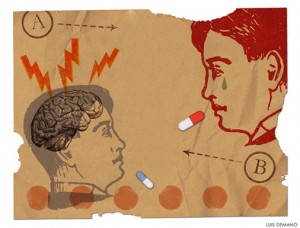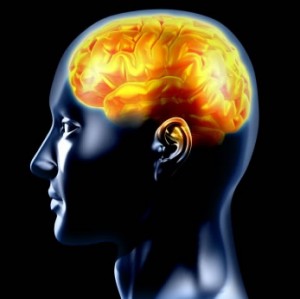Published: September 30, 2011
 Many psychiatric conditions are caused by aberrant metabolism of the neurotransmitter serotonin. Researchers in the Department of Pharmacy at LMU have now developed a new screening method, which will facilitate the search for new drugs that modulate the biological activity of serotonin.
Many psychiatric conditions are caused by aberrant metabolism of the neurotransmitter serotonin. Researchers in the Department of Pharmacy at LMU have now developed a new screening method, which will facilitate the search for new drugs that modulate the biological activity of serotonin.
Psychiatric ailments such as depression, obsessive-compulsive disorder or anxiety states are often associated with disturbances in the metabolism of the neurotransmitter serotonin. Neurotransmitters are compounds that are released from the synapses at nerve cell endings and activate the firing of neighboring neurons. Thus, as their name suggests, they mediate the transmission of nerve impulses. The serotonin transporter (SERT) is responsible for reuptake of the transmitter into neurons, terminating its action. SERT is a major target for drugs that are used to treat many mood disorders, and the search for new SERT inhibitors is of continuing therapeutic relevance.
A research team led by Professor Klaus Wanner of the Department of Pharmacy in the Center for Pharmaceutical Research at Ludwig-Maximilians Univeristät München (LMU) has now developed a novel binding assay, based on the use of mass spectrometry (MS), which promises to simplify the search for potential SERT inhibitors very significantly. The major advantage of the technique is that, unlike conventional binding assays, it avoids the need to use radiolabeled substances.
A paper that describes the new assay will appear in the journal ChemMedChem on 4. October. The article has been rated as a “very important paper” and is featured on the cover of the upcoming issue of the journal. [continue reading…]
Published: September 4, 2011

© iStockphoto
n a study of people with serious depression that wasn’t responding to an antidepressant, vigorous exercise was as effective as or more effective than adding a second medication for achieving remission.
In the New York Times Grechen Reynolds ponders the effect of exercise as a prescription for depression .
Clinical depression, as anyone who has experienced or watched a loved one struggle with the condition knows, can be stubbornly intractable. Even if patients have been taking an antidepressant for months, recovery rates tend to hover below 50 percent.
In order to increase the odds of improvement, doctors frequently add a second treatment — often another drug, like lithium or an antipsychotic — to the S.S.R.I. regimen at some point, Dr. Trivedi said. Most patients ultimately require at least two concurrent treatments to achieve remission of their depression, he said. Studies have shown that these secondary drug treatments help an additional 20 to 30 percent of depressed patients to improve, but the medications can be expensive and have unpleasant side effects.
Which prompted Dr. Trivedi to look to exercise. His investigation joins a growing movement among some physiologists and doctors to consider and study exercise as a formal medicine, with patients given a prescription and their progress monitored, as it would be if they were prescribed a pill. link to read article
Source: The New York Times
Published: August 23, 2011

Image : iStockphoto
ll of us, at times, ruminate or brood on a problem in order to make the best possible decision in a complex situation. But sometimes, rumination becomes unproductive or even detrimental to making good life choices. Such is the case in depression, where non-productive ruminations are a common and distressing symptom of the disorder. In fact, individuals suffering from depression often ruminate about being depressed. This ruminative thinking can be either passive and maladaptive (i.e., worrying) or active and solution-focused (i.e., coping). New research by Stanford University researchers, published in
Elsevier’s Biological Psychiatry, provides insights into how these types of rumination are represented in the brains of depressed persons.
[continue reading…]
Published: August 21, 2011
Natasha Mitchell in another excellent All in the Mind this week turns a spotlight on depression.
Hippocrates thought melancholia was caused by too much black bile. Now some scientists describe the Black Dog as an inflammatory illness. Heart disease, oxidative stress and omega 3 are all part of the compelling story too, where body and mind reunite.
 Listen Now
Listen Now
Source: All in the Mind
 Many psychiatric conditions are caused by aberrant metabolism of the neurotransmitter serotonin. Researchers in the Department of Pharmacy at LMU have now developed a new screening method, which will facilitate the search for new drugs that modulate the biological activity of serotonin.
Many psychiatric conditions are caused by aberrant metabolism of the neurotransmitter serotonin. Researchers in the Department of Pharmacy at LMU have now developed a new screening method, which will facilitate the search for new drugs that modulate the biological activity of serotonin.

